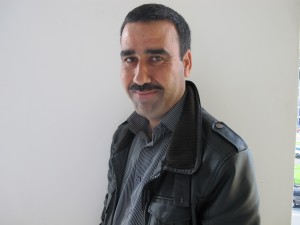Noor’s story – paying a price for educational equality
 Last month Pakistani schoolgirl Malala Yousafzai was awarded the European Parliament’s Sakharov Prize for Freedom of Thought over her championing of girls education.
Last month Pakistani schoolgirl Malala Yousafzai was awarded the European Parliament’s Sakharov Prize for Freedom of Thought over her championing of girls education.
As Malala’s prize was being announced, Muhammad Noor was quietly living in a weatherboard cottage in Melbourne’s west.
AMES client Mr Noor, a teacher also from Pakistan, fled his home country after being shot in the chest and left for dead by the Taliban after they took exception to his work educating girls.
Now he faces an uncertain future because of Australia’s immigration and border protection policies.
In 1996 Mr Noor founded a school for disadvantaged boys and girls.
“The Taliban told me I cannot teach girls, that this is against the Islamic way and that I should close my school,” Mr Noor said this week.
“When I did not close, the Taliban came. They shot me and they destroyed my school with rocket propelled grenades,” He said.
Neighbours rushed Mr Noor to a local hospital, where he spent three months recovering.
Mr Noor is one of hundreds thousands of Shia Muslims across the Middle East who have been subjected to persecution from governments or militant extremist groups.
After recovering from the assassination attempt and fleeing Pakistan, the 33-year-old worked in the United Arab Emirates as a construction supervisor until the government there revoked the visas of more than 4,000 Shiite Muslims in February. “When the government of the UAE cancelled the visas of all Shias and gave us one week to leave the country I was again forced to leave my home,” Mr Noor said.
He paid $9000 to a Malaysian people-smuggler to take him by boat to Australia, with the promise of a ‘‘good, safe country’’. Mr Noor says the boat trip was four nights and three days of constant fear.
“It was very difficult, there was no water or food and we got no chance to sleep. We all felt like the boat would sink and we would all die,” he said. Mr Noor’s boat was rescued by the Royal Australian Navy and he was taken to Christmas Island.
After a month in detention, he was released into the community in Adelaide and then made his way to Melbourne with a friend.
Mr Noor speaks five languages and recently has been working as a volunteer at his local church.
Like around 30,000 other asylum seekers who have arrived since August last year the best he can hope for is a temporary protection visa, which means he has to reapply for protection every three years and may ultimately be forced to return home.
‘‘If I go back to my country, the Taliban will be waiting for me. They will kill me because I challenged them over my school,’’ Mr Noor said.
He now lives in a house in Melbourne’s west, supported by AMES, sharing with four other asylum seekers. He says he does not know what the future holds.
‘‘We don’t know what will happen. All we can do is pray,’’ Mr Noor said.












